IFRS Adoption Impact on Accounting Information: Australian Context
VerifiedAdded on 2023/06/11
|8
|2066
|319
Report
AI Summary
This report examines the impact of IFRS adoption on accounting information in Australia, focusing on the value relevance of earnings and book values. The study utilizes a longitudinal approach, comparing pre-IFRS and post-IFRS periods (1990-2008), and finds that earnings became increasingly value-relevant after IFRS adoption, particularly for industrial firms. The research aligns with existing literature suggesting that IFRS adoption enhances the value relevance of accounting information, especially concerning book values. The Ohlson Model is used to link market value to earnings per share and book value, demonstrating that book value is value-relevant in determining stock prices. The findings suggest that IFRS implementation, with its emphasis on fair value representation, leads to a closer alignment of book and market values, ultimately improving the economic decision-usefulness of financial statements for investors. The report concludes that while the harmonized regulatory framework of IFRS has generally been successful in enhancing the relevance of accounting information, further research is needed to fully understand the implications of IFRS adoption and implementation.
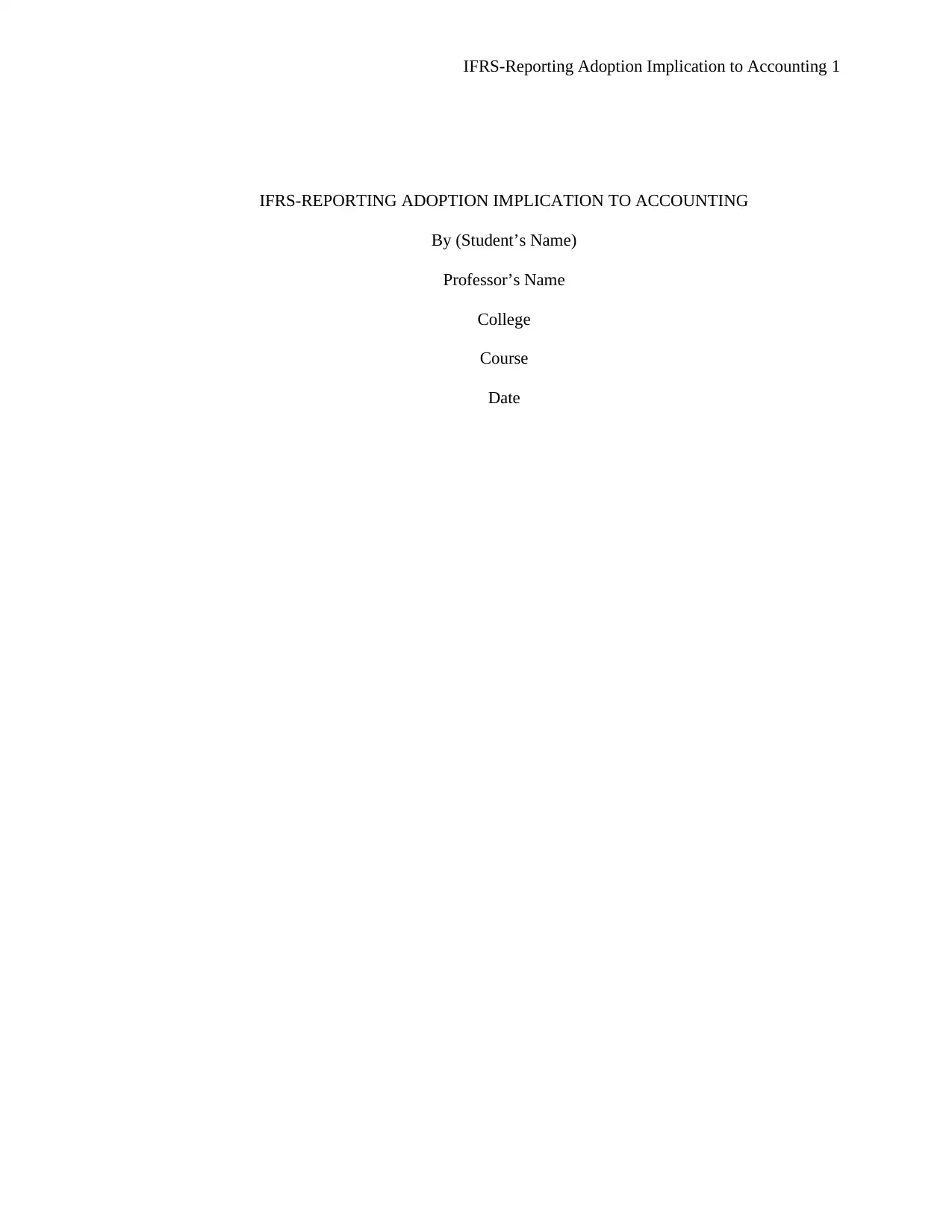
IFRS-Reporting Adoption Implication to Accounting 1
IFRS-REPORTING ADOPTION IMPLICATION TO ACCOUNTING
By (Student’s Name)
Professor’s Name
College
Course
Date
IFRS-REPORTING ADOPTION IMPLICATION TO ACCOUNTING
By (Student’s Name)
Professor’s Name
College
Course
Date
Paraphrase This Document
Need a fresh take? Get an instant paraphrase of this document with our AI Paraphraser
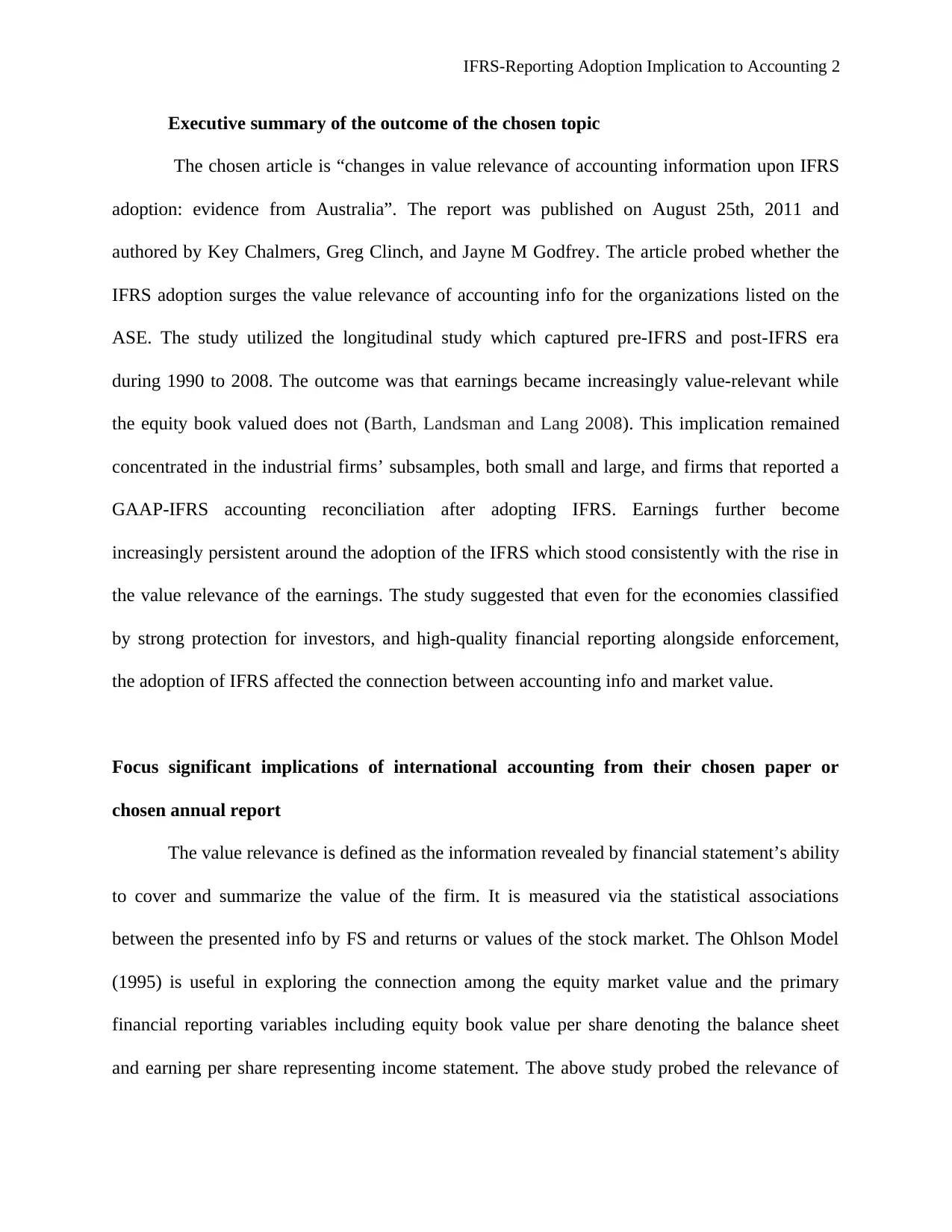
IFRS-Reporting Adoption Implication to Accounting 2
Executive summary of the outcome of the chosen topic
The chosen article is “changes in value relevance of accounting information upon IFRS
adoption: evidence from Australia”. The report was published on August 25th, 2011 and
authored by Key Chalmers, Greg Clinch, and Jayne M Godfrey. The article probed whether the
IFRS adoption surges the value relevance of accounting info for the organizations listed on the
ASE. The study utilized the longitudinal study which captured pre-IFRS and post-IFRS era
during 1990 to 2008. The outcome was that earnings became increasingly value-relevant while
the equity book valued does not (Barth, Landsman and Lang 2008). This implication remained
concentrated in the industrial firms’ subsamples, both small and large, and firms that reported a
GAAP-IFRS accounting reconciliation after adopting IFRS. Earnings further become
increasingly persistent around the adoption of the IFRS which stood consistently with the rise in
the value relevance of the earnings. The study suggested that even for the economies classified
by strong protection for investors, and high-quality financial reporting alongside enforcement,
the adoption of IFRS affected the connection between accounting info and market value.
Focus significant implications of international accounting from their chosen paper or
chosen annual report
The value relevance is defined as the information revealed by financial statement’s ability
to cover and summarize the value of the firm. It is measured via the statistical associations
between the presented info by FS and returns or values of the stock market. The Ohlson Model
(1995) is useful in exploring the connection among the equity market value and the primary
financial reporting variables including equity book value per share denoting the balance sheet
and earning per share representing income statement. The above study probed the relevance of
Executive summary of the outcome of the chosen topic
The chosen article is “changes in value relevance of accounting information upon IFRS
adoption: evidence from Australia”. The report was published on August 25th, 2011 and
authored by Key Chalmers, Greg Clinch, and Jayne M Godfrey. The article probed whether the
IFRS adoption surges the value relevance of accounting info for the organizations listed on the
ASE. The study utilized the longitudinal study which captured pre-IFRS and post-IFRS era
during 1990 to 2008. The outcome was that earnings became increasingly value-relevant while
the equity book valued does not (Barth, Landsman and Lang 2008). This implication remained
concentrated in the industrial firms’ subsamples, both small and large, and firms that reported a
GAAP-IFRS accounting reconciliation after adopting IFRS. Earnings further become
increasingly persistent around the adoption of the IFRS which stood consistently with the rise in
the value relevance of the earnings. The study suggested that even for the economies classified
by strong protection for investors, and high-quality financial reporting alongside enforcement,
the adoption of IFRS affected the connection between accounting info and market value.
Focus significant implications of international accounting from their chosen paper or
chosen annual report
The value relevance is defined as the information revealed by financial statement’s ability
to cover and summarize the value of the firm. It is measured via the statistical associations
between the presented info by FS and returns or values of the stock market. The Ohlson Model
(1995) is useful in exploring the connection among the equity market value and the primary
financial reporting variables including equity book value per share denoting the balance sheet
and earning per share representing income statement. The above study probed the relevance of
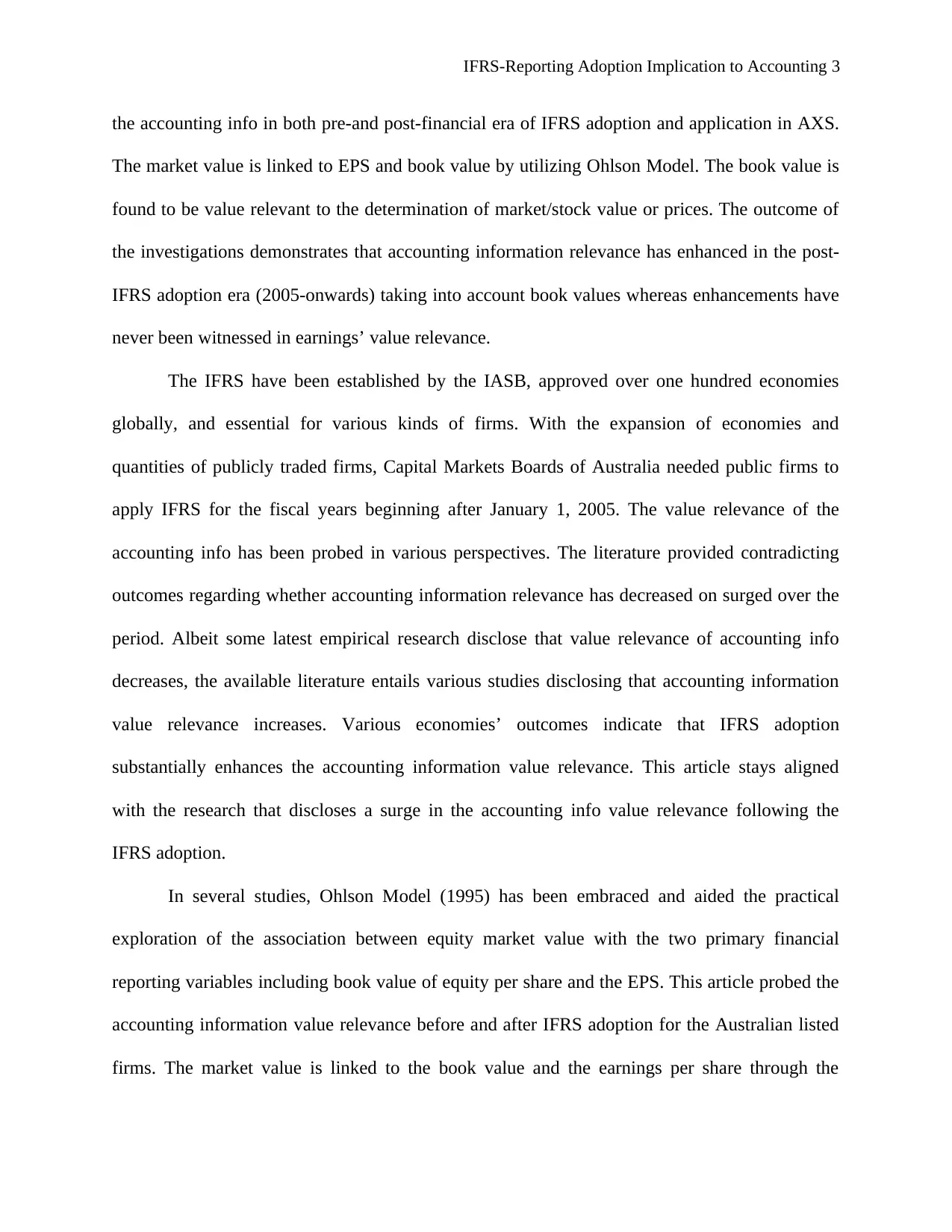
IFRS-Reporting Adoption Implication to Accounting 3
the accounting info in both pre-and post-financial era of IFRS adoption and application in AXS.
The market value is linked to EPS and book value by utilizing Ohlson Model. The book value is
found to be value relevant to the determination of market/stock value or prices. The outcome of
the investigations demonstrates that accounting information relevance has enhanced in the post-
IFRS adoption era (2005-onwards) taking into account book values whereas enhancements have
never been witnessed in earnings’ value relevance.
The IFRS have been established by the IASB, approved over one hundred economies
globally, and essential for various kinds of firms. With the expansion of economies and
quantities of publicly traded firms, Capital Markets Boards of Australia needed public firms to
apply IFRS for the fiscal years beginning after January 1, 2005. The value relevance of the
accounting info has been probed in various perspectives. The literature provided contradicting
outcomes regarding whether accounting information relevance has decreased on surged over the
period. Albeit some latest empirical research disclose that value relevance of accounting info
decreases, the available literature entails various studies disclosing that accounting information
value relevance increases. Various economies’ outcomes indicate that IFRS adoption
substantially enhances the accounting information value relevance. This article stays aligned
with the research that discloses a surge in the accounting info value relevance following the
IFRS adoption.
In several studies, Ohlson Model (1995) has been embraced and aided the practical
exploration of the association between equity market value with the two primary financial
reporting variables including book value of equity per share and the EPS. This article probed the
accounting information value relevance before and after IFRS adoption for the Australian listed
firms. The market value is linked to the book value and the earnings per share through the
the accounting info in both pre-and post-financial era of IFRS adoption and application in AXS.
The market value is linked to EPS and book value by utilizing Ohlson Model. The book value is
found to be value relevant to the determination of market/stock value or prices. The outcome of
the investigations demonstrates that accounting information relevance has enhanced in the post-
IFRS adoption era (2005-onwards) taking into account book values whereas enhancements have
never been witnessed in earnings’ value relevance.
The IFRS have been established by the IASB, approved over one hundred economies
globally, and essential for various kinds of firms. With the expansion of economies and
quantities of publicly traded firms, Capital Markets Boards of Australia needed public firms to
apply IFRS for the fiscal years beginning after January 1, 2005. The value relevance of the
accounting info has been probed in various perspectives. The literature provided contradicting
outcomes regarding whether accounting information relevance has decreased on surged over the
period. Albeit some latest empirical research disclose that value relevance of accounting info
decreases, the available literature entails various studies disclosing that accounting information
value relevance increases. Various economies’ outcomes indicate that IFRS adoption
substantially enhances the accounting information value relevance. This article stays aligned
with the research that discloses a surge in the accounting info value relevance following the
IFRS adoption.
In several studies, Ohlson Model (1995) has been embraced and aided the practical
exploration of the association between equity market value with the two primary financial
reporting variables including book value of equity per share and the EPS. This article probed the
accounting information value relevance before and after IFRS adoption for the Australian listed
firms. The market value is linked to the book value and the earnings per share through the
⊘ This is a preview!⊘
Do you want full access?
Subscribe today to unlock all pages.

Trusted by 1+ million students worldwide
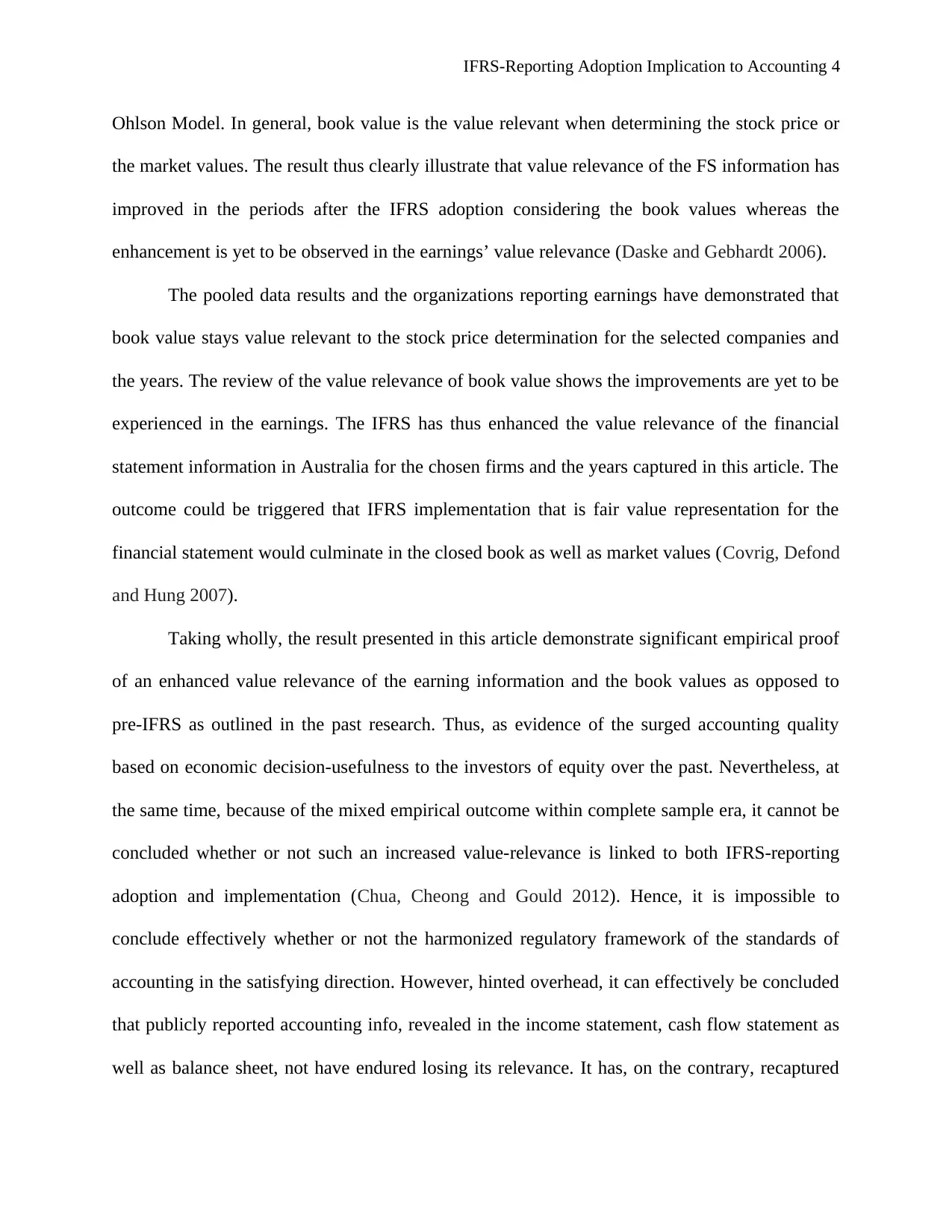
IFRS-Reporting Adoption Implication to Accounting 4
Ohlson Model. In general, book value is the value relevant when determining the stock price or
the market values. The result thus clearly illustrate that value relevance of the FS information has
improved in the periods after the IFRS adoption considering the book values whereas the
enhancement is yet to be observed in the earnings’ value relevance (Daske and Gebhardt 2006).
The pooled data results and the organizations reporting earnings have demonstrated that
book value stays value relevant to the stock price determination for the selected companies and
the years. The review of the value relevance of book value shows the improvements are yet to be
experienced in the earnings. The IFRS has thus enhanced the value relevance of the financial
statement information in Australia for the chosen firms and the years captured in this article. The
outcome could be triggered that IFRS implementation that is fair value representation for the
financial statement would culminate in the closed book as well as market values (Covrig, Defond
and Hung 2007).
Taking wholly, the result presented in this article demonstrate significant empirical proof
of an enhanced value relevance of the earning information and the book values as opposed to
pre-IFRS as outlined in the past research. Thus, as evidence of the surged accounting quality
based on economic decision-usefulness to the investors of equity over the past. Nevertheless, at
the same time, because of the mixed empirical outcome within complete sample era, it cannot be
concluded whether or not such an increased value-relevance is linked to both IFRS-reporting
adoption and implementation (Chua, Cheong and Gould 2012). Hence, it is impossible to
conclude effectively whether or not the harmonized regulatory framework of the standards of
accounting in the satisfying direction. However, hinted overhead, it can effectively be concluded
that publicly reported accounting info, revealed in the income statement, cash flow statement as
well as balance sheet, not have endured losing its relevance. It has, on the contrary, recaptured
Ohlson Model. In general, book value is the value relevant when determining the stock price or
the market values. The result thus clearly illustrate that value relevance of the FS information has
improved in the periods after the IFRS adoption considering the book values whereas the
enhancement is yet to be observed in the earnings’ value relevance (Daske and Gebhardt 2006).
The pooled data results and the organizations reporting earnings have demonstrated that
book value stays value relevant to the stock price determination for the selected companies and
the years. The review of the value relevance of book value shows the improvements are yet to be
experienced in the earnings. The IFRS has thus enhanced the value relevance of the financial
statement information in Australia for the chosen firms and the years captured in this article. The
outcome could be triggered that IFRS implementation that is fair value representation for the
financial statement would culminate in the closed book as well as market values (Covrig, Defond
and Hung 2007).
Taking wholly, the result presented in this article demonstrate significant empirical proof
of an enhanced value relevance of the earning information and the book values as opposed to
pre-IFRS as outlined in the past research. Thus, as evidence of the surged accounting quality
based on economic decision-usefulness to the investors of equity over the past. Nevertheless, at
the same time, because of the mixed empirical outcome within complete sample era, it cannot be
concluded whether or not such an increased value-relevance is linked to both IFRS-reporting
adoption and implementation (Chua, Cheong and Gould 2012). Hence, it is impossible to
conclude effectively whether or not the harmonized regulatory framework of the standards of
accounting in the satisfying direction. However, hinted overhead, it can effectively be concluded
that publicly reported accounting info, revealed in the income statement, cash flow statement as
well as balance sheet, not have endured losing its relevance. It has, on the contrary, recaptured
Paraphrase This Document
Need a fresh take? Get an instant paraphrase of this document with our AI Paraphraser
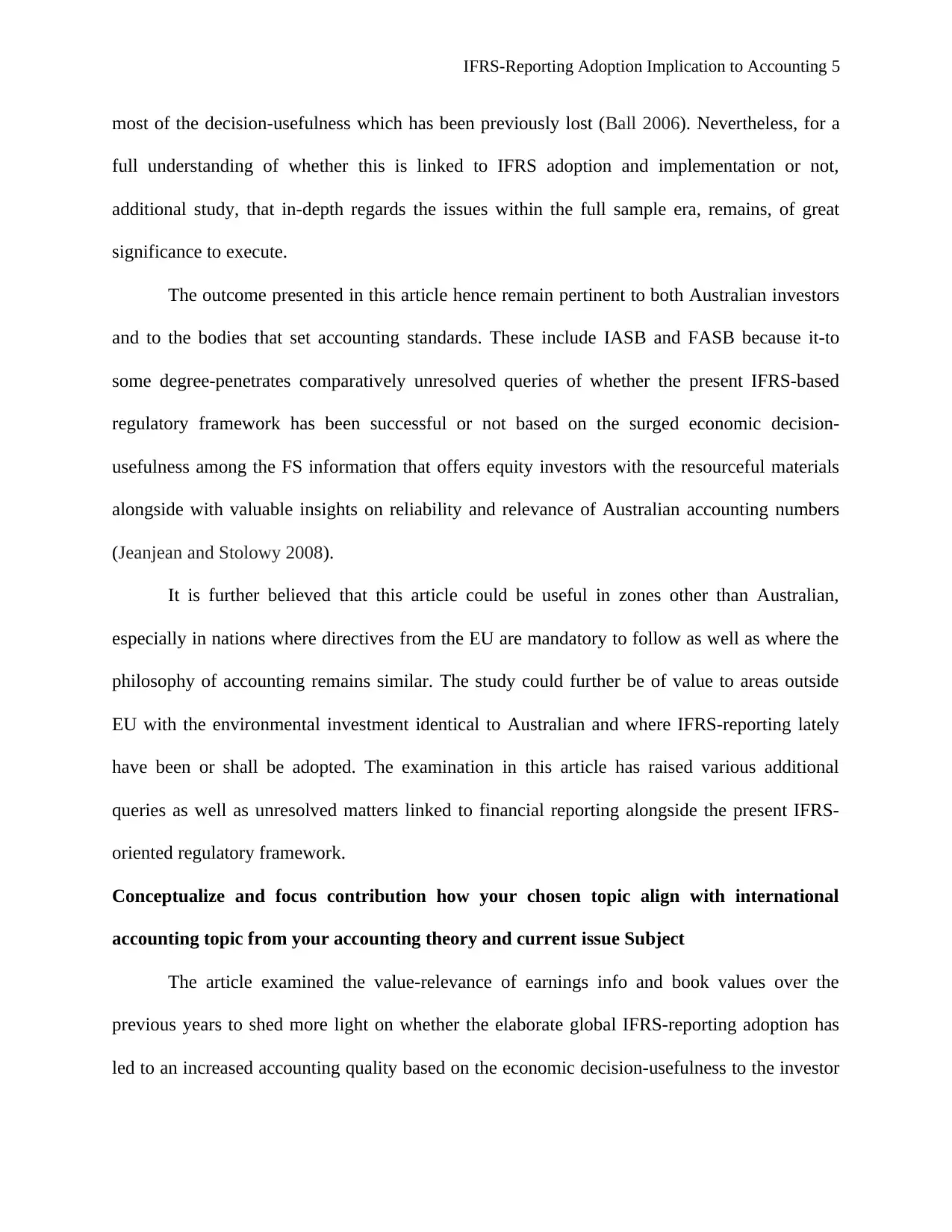
IFRS-Reporting Adoption Implication to Accounting 5
most of the decision-usefulness which has been previously lost (Ball 2006). Nevertheless, for a
full understanding of whether this is linked to IFRS adoption and implementation or not,
additional study, that in-depth regards the issues within the full sample era, remains, of great
significance to execute.
The outcome presented in this article hence remain pertinent to both Australian investors
and to the bodies that set accounting standards. These include IASB and FASB because it-to
some degree-penetrates comparatively unresolved queries of whether the present IFRS-based
regulatory framework has been successful or not based on the surged economic decision-
usefulness among the FS information that offers equity investors with the resourceful materials
alongside with valuable insights on reliability and relevance of Australian accounting numbers
(Jeanjean and Stolowy 2008).
It is further believed that this article could be useful in zones other than Australian,
especially in nations where directives from the EU are mandatory to follow as well as where the
philosophy of accounting remains similar. The study could further be of value to areas outside
EU with the environmental investment identical to Australian and where IFRS-reporting lately
have been or shall be adopted. The examination in this article has raised various additional
queries as well as unresolved matters linked to financial reporting alongside the present IFRS-
oriented regulatory framework.
Conceptualize and focus contribution how your chosen topic align with international
accounting topic from your accounting theory and current issue Subject
The article examined the value-relevance of earnings info and book values over the
previous years to shed more light on whether the elaborate global IFRS-reporting adoption has
led to an increased accounting quality based on the economic decision-usefulness to the investor
most of the decision-usefulness which has been previously lost (Ball 2006). Nevertheless, for a
full understanding of whether this is linked to IFRS adoption and implementation or not,
additional study, that in-depth regards the issues within the full sample era, remains, of great
significance to execute.
The outcome presented in this article hence remain pertinent to both Australian investors
and to the bodies that set accounting standards. These include IASB and FASB because it-to
some degree-penetrates comparatively unresolved queries of whether the present IFRS-based
regulatory framework has been successful or not based on the surged economic decision-
usefulness among the FS information that offers equity investors with the resourceful materials
alongside with valuable insights on reliability and relevance of Australian accounting numbers
(Jeanjean and Stolowy 2008).
It is further believed that this article could be useful in zones other than Australian,
especially in nations where directives from the EU are mandatory to follow as well as where the
philosophy of accounting remains similar. The study could further be of value to areas outside
EU with the environmental investment identical to Australian and where IFRS-reporting lately
have been or shall be adopted. The examination in this article has raised various additional
queries as well as unresolved matters linked to financial reporting alongside the present IFRS-
oriented regulatory framework.
Conceptualize and focus contribution how your chosen topic align with international
accounting topic from your accounting theory and current issue Subject
The article examined the value-relevance of earnings info and book values over the
previous years to shed more light on whether the elaborate global IFRS-reporting adoption has
led to an increased accounting quality based on the economic decision-usefulness to the investor
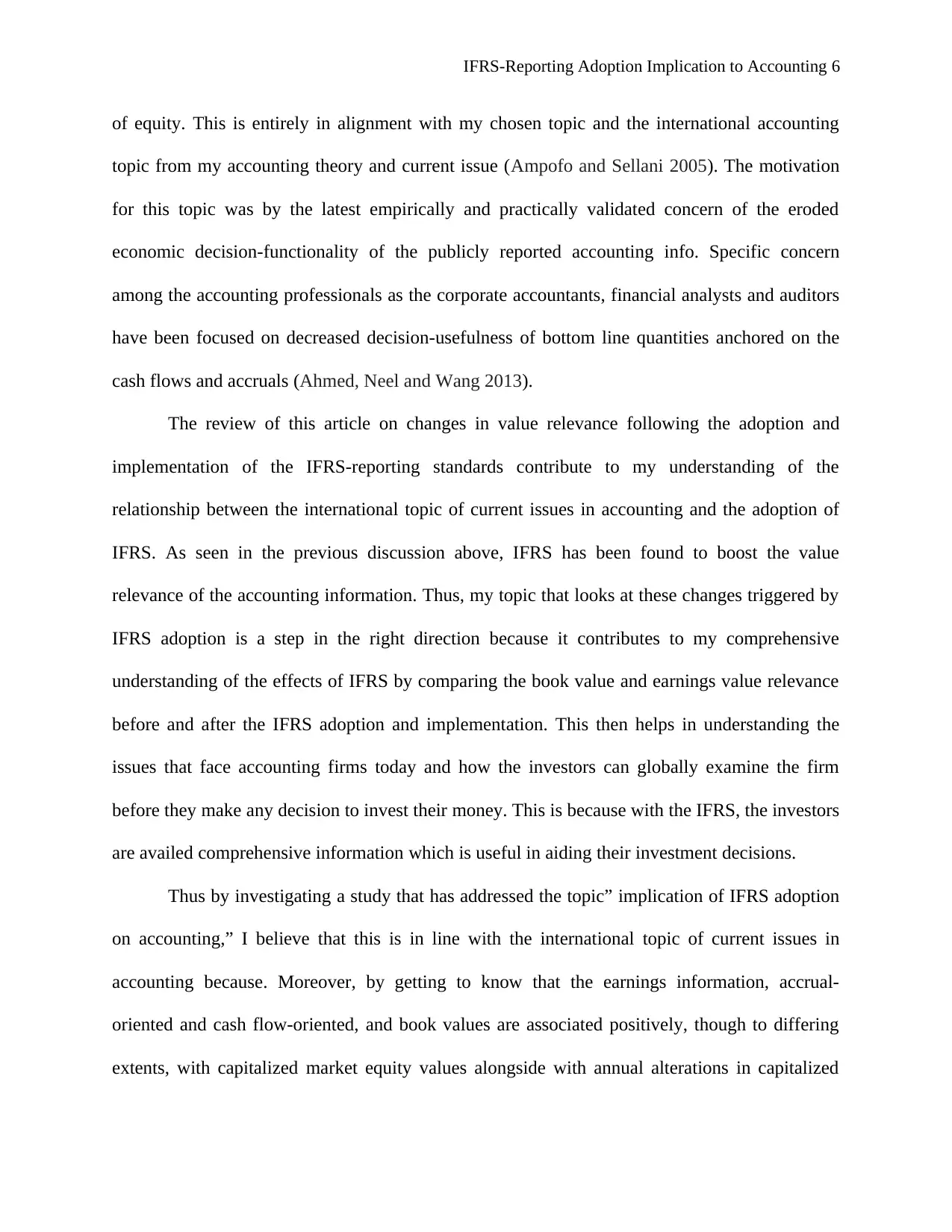
IFRS-Reporting Adoption Implication to Accounting 6
of equity. This is entirely in alignment with my chosen topic and the international accounting
topic from my accounting theory and current issue (Ampofo and Sellani 2005). The motivation
for this topic was by the latest empirically and practically validated concern of the eroded
economic decision-functionality of the publicly reported accounting info. Specific concern
among the accounting professionals as the corporate accountants, financial analysts and auditors
have been focused on decreased decision-usefulness of bottom line quantities anchored on the
cash flows and accruals (Ahmed, Neel and Wang 2013).
The review of this article on changes in value relevance following the adoption and
implementation of the IFRS-reporting standards contribute to my understanding of the
relationship between the international topic of current issues in accounting and the adoption of
IFRS. As seen in the previous discussion above, IFRS has been found to boost the value
relevance of the accounting information. Thus, my topic that looks at these changes triggered by
IFRS adoption is a step in the right direction because it contributes to my comprehensive
understanding of the effects of IFRS by comparing the book value and earnings value relevance
before and after the IFRS adoption and implementation. This then helps in understanding the
issues that face accounting firms today and how the investors can globally examine the firm
before they make any decision to invest their money. This is because with the IFRS, the investors
are availed comprehensive information which is useful in aiding their investment decisions.
Thus by investigating a study that has addressed the topic” implication of IFRS adoption
on accounting,” I believe that this is in line with the international topic of current issues in
accounting because. Moreover, by getting to know that the earnings information, accrual-
oriented and cash flow-oriented, and book values are associated positively, though to differing
extents, with capitalized market equity values alongside with annual alterations in capitalized
of equity. This is entirely in alignment with my chosen topic and the international accounting
topic from my accounting theory and current issue (Ampofo and Sellani 2005). The motivation
for this topic was by the latest empirically and practically validated concern of the eroded
economic decision-functionality of the publicly reported accounting info. Specific concern
among the accounting professionals as the corporate accountants, financial analysts and auditors
have been focused on decreased decision-usefulness of bottom line quantities anchored on the
cash flows and accruals (Ahmed, Neel and Wang 2013).
The review of this article on changes in value relevance following the adoption and
implementation of the IFRS-reporting standards contribute to my understanding of the
relationship between the international topic of current issues in accounting and the adoption of
IFRS. As seen in the previous discussion above, IFRS has been found to boost the value
relevance of the accounting information. Thus, my topic that looks at these changes triggered by
IFRS adoption is a step in the right direction because it contributes to my comprehensive
understanding of the effects of IFRS by comparing the book value and earnings value relevance
before and after the IFRS adoption and implementation. This then helps in understanding the
issues that face accounting firms today and how the investors can globally examine the firm
before they make any decision to invest their money. This is because with the IFRS, the investors
are availed comprehensive information which is useful in aiding their investment decisions.
Thus by investigating a study that has addressed the topic” implication of IFRS adoption
on accounting,” I believe that this is in line with the international topic of current issues in
accounting because. Moreover, by getting to know that the earnings information, accrual-
oriented and cash flow-oriented, and book values are associated positively, though to differing
extents, with capitalized market equity values alongside with annual alterations in capitalized
⊘ This is a preview!⊘
Do you want full access?
Subscribe today to unlock all pages.

Trusted by 1+ million students worldwide
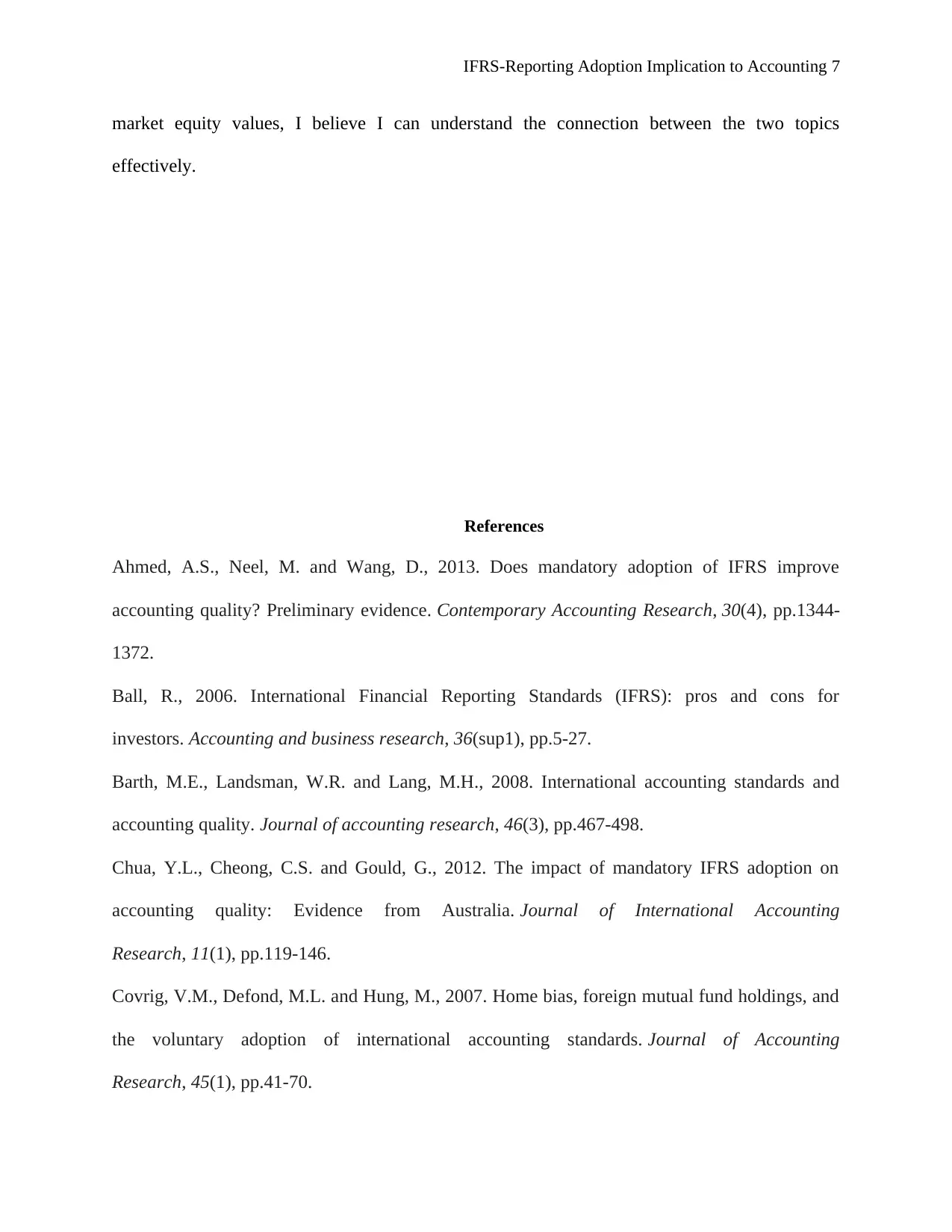
IFRS-Reporting Adoption Implication to Accounting 7
market equity values, I believe I can understand the connection between the two topics
effectively.
References
Ahmed, A.S., Neel, M. and Wang, D., 2013. Does mandatory adoption of IFRS improve
accounting quality? Preliminary evidence. Contemporary Accounting Research, 30(4), pp.1344-
1372.
Ball, R., 2006. International Financial Reporting Standards (IFRS): pros and cons for
investors. Accounting and business research, 36(sup1), pp.5-27.
Barth, M.E., Landsman, W.R. and Lang, M.H., 2008. International accounting standards and
accounting quality. Journal of accounting research, 46(3), pp.467-498.
Chua, Y.L., Cheong, C.S. and Gould, G., 2012. The impact of mandatory IFRS adoption on
accounting quality: Evidence from Australia. Journal of International Accounting
Research, 11(1), pp.119-146.
Covrig, V.M., Defond, M.L. and Hung, M., 2007. Home bias, foreign mutual fund holdings, and
the voluntary adoption of international accounting standards. Journal of Accounting
Research, 45(1), pp.41-70.
market equity values, I believe I can understand the connection between the two topics
effectively.
References
Ahmed, A.S., Neel, M. and Wang, D., 2013. Does mandatory adoption of IFRS improve
accounting quality? Preliminary evidence. Contemporary Accounting Research, 30(4), pp.1344-
1372.
Ball, R., 2006. International Financial Reporting Standards (IFRS): pros and cons for
investors. Accounting and business research, 36(sup1), pp.5-27.
Barth, M.E., Landsman, W.R. and Lang, M.H., 2008. International accounting standards and
accounting quality. Journal of accounting research, 46(3), pp.467-498.
Chua, Y.L., Cheong, C.S. and Gould, G., 2012. The impact of mandatory IFRS adoption on
accounting quality: Evidence from Australia. Journal of International Accounting
Research, 11(1), pp.119-146.
Covrig, V.M., Defond, M.L. and Hung, M., 2007. Home bias, foreign mutual fund holdings, and
the voluntary adoption of international accounting standards. Journal of Accounting
Research, 45(1), pp.41-70.
Paraphrase This Document
Need a fresh take? Get an instant paraphrase of this document with our AI Paraphraser
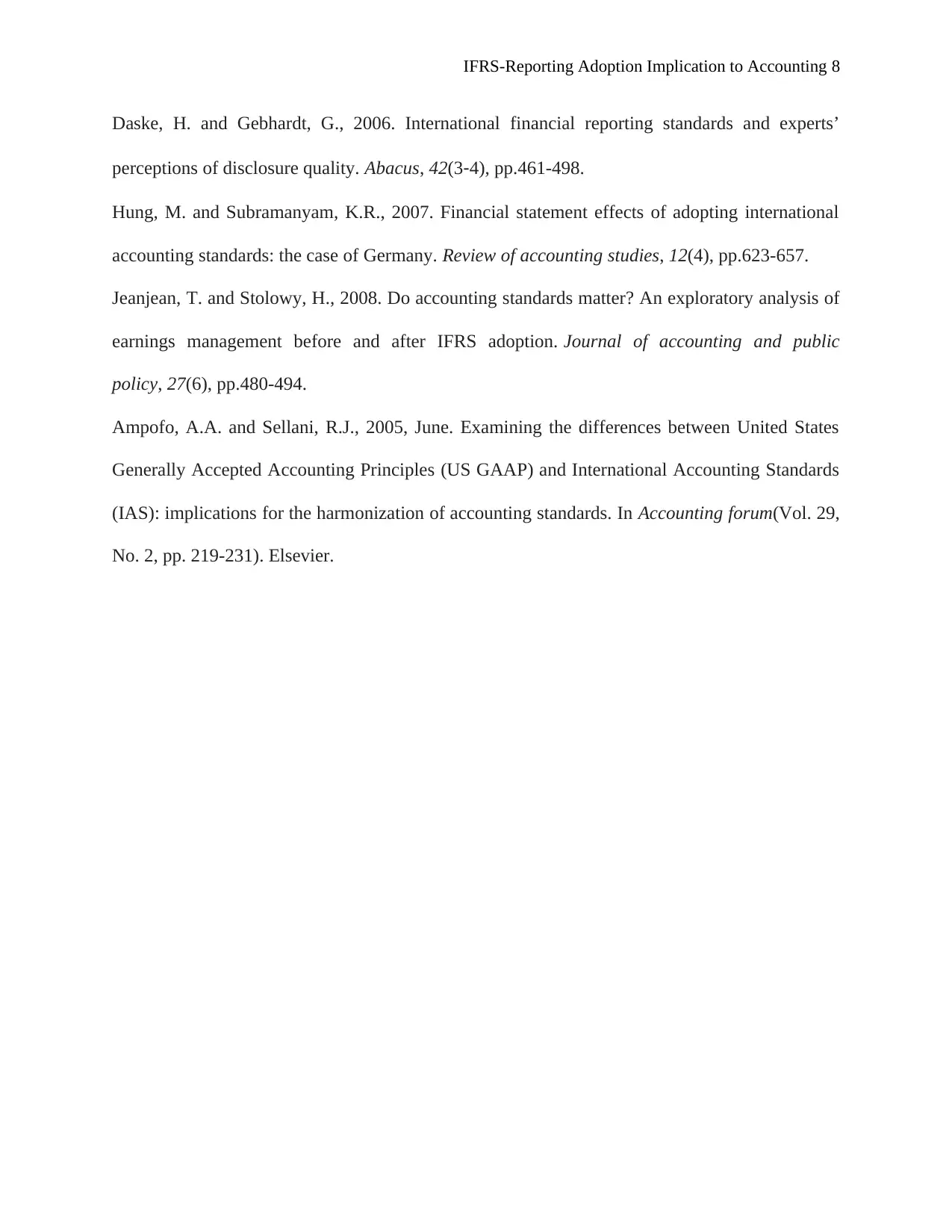
IFRS-Reporting Adoption Implication to Accounting 8
Daske, H. and Gebhardt, G., 2006. International financial reporting standards and experts’
perceptions of disclosure quality. Abacus, 42(3‐4), pp.461-498.
Hung, M. and Subramanyam, K.R., 2007. Financial statement effects of adopting international
accounting standards: the case of Germany. Review of accounting studies, 12(4), pp.623-657.
Jeanjean, T. and Stolowy, H., 2008. Do accounting standards matter? An exploratory analysis of
earnings management before and after IFRS adoption. Journal of accounting and public
policy, 27(6), pp.480-494.
Ampofo, A.A. and Sellani, R.J., 2005, June. Examining the differences between United States
Generally Accepted Accounting Principles (US GAAP) and International Accounting Standards
(IAS): implications for the harmonization of accounting standards. In Accounting forum(Vol. 29,
No. 2, pp. 219-231). Elsevier.
Daske, H. and Gebhardt, G., 2006. International financial reporting standards and experts’
perceptions of disclosure quality. Abacus, 42(3‐4), pp.461-498.
Hung, M. and Subramanyam, K.R., 2007. Financial statement effects of adopting international
accounting standards: the case of Germany. Review of accounting studies, 12(4), pp.623-657.
Jeanjean, T. and Stolowy, H., 2008. Do accounting standards matter? An exploratory analysis of
earnings management before and after IFRS adoption. Journal of accounting and public
policy, 27(6), pp.480-494.
Ampofo, A.A. and Sellani, R.J., 2005, June. Examining the differences between United States
Generally Accepted Accounting Principles (US GAAP) and International Accounting Standards
(IAS): implications for the harmonization of accounting standards. In Accounting forum(Vol. 29,
No. 2, pp. 219-231). Elsevier.
1 out of 8
Related Documents
Your All-in-One AI-Powered Toolkit for Academic Success.
+13062052269
info@desklib.com
Available 24*7 on WhatsApp / Email
![[object Object]](/_next/static/media/star-bottom.7253800d.svg)
Unlock your academic potential
Copyright © 2020–2026 A2Z Services. All Rights Reserved. Developed and managed by ZUCOL.




